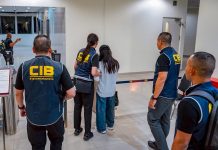
BANGKOK – A survey has found that Thai people become obviously lenient in protecting themselves from the coronavirus disease 2019 (COVID-19) when it comes to sanitizing hands, eating newly cooked food, using personal spoons, keeping distances from each other and refraining from touching faces.
The Public Health Ministry, the World Health Organization, the Faculty of Medicine Siriraj Hospital, the Faculty of Medicine Ramathibodi Hospital, the National Health Security Office and the National Statistical Office conducted the survey on COVID-19 control after business lockdowns were eased. The survey occurred on May 8-14 and there were 19,378 respondents.
Of the respondents, 91% wore face masks but other self-hygienic practices were statistically significantly overlooked.
The percentages of hygienic practices fell to 83.4% for washing hand with soap or alcohol gel, 82.3% for eating newly cooked food with personal spoons, 60.7% for social distancing, 52.9% for refraining from touching faces, and 72.5% for overall self-protection.
After eased lockdowns, the most popular places that respondents visited were wet markets and supermarkets (visited by 74% of respondents), followed by offices (60.5%), clinics and hospitals (29.1%), restaurants (21%), barbers’ shops and hairdressers’ (17.6%), religious places (11%), parks (6.8%), stadiums (3.9%), grooming shops and pet hotels (3.5%), natural tourists attractions, archeological sites and museums (3.1%), and golf courses (2.8%). Of all respondents, 26% travelled to other provinces.
Disease control measures were implemented at 57.6% of surveyed premises and the best practices happened at hospitals and clinics, followed by offices, wet markets and supermarkets, barbers’ and hairdressers’, and restaurants.
The places that implemented less than 50% of disease control measures were religious places, golf courses, grooming shops and pet hotels, parks, stadiums, natural tourist destinations, archeological sites and museums. (TNA)
 |
 |
 |





